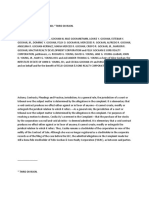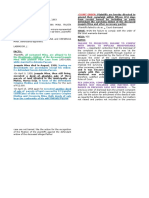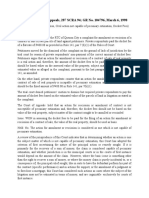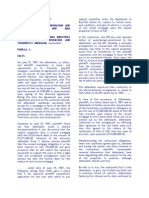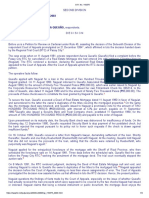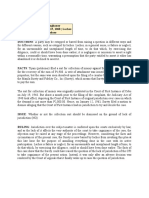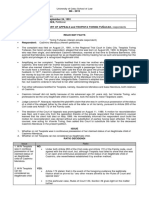Cabrera V Tiano
Cabrera V Tiano
Uploaded by
BGodCopyright:
Available Formats
Cabrera V Tiano
Cabrera V Tiano
Uploaded by
BGodOriginal Title
Copyright
Available Formats
Share this document
Did you find this document useful?
Is this content inappropriate?
Copyright:
Available Formats
Cabrera V Tiano
Cabrera V Tiano
Uploaded by
BGodCopyright:
Available Formats
33.
CABRERA v TIANO
G.R. No. L-17299 | July 31, 1963
Raida Grefiel
FACTS:
Spouses Ciriaco and Gregoria Potestas owned a seven-hectare agricultural land in Misamis Occidental. They had five children
namely Isabelo, Lourdes, and Clemente, Josefine, and Cresencia. The wife Gregoria and her child Clemente died. The husband
Ciriaco, with three other children (Isabelo, Lourdes, and Cresencia) sold the land to Mariano Tiano for P3,500 on July 2, 1947.
At the time of the sale, Cresencia was a minor and Josefina did not sign the deed of sale.
On June 20, 1957, Josefina and Cresencia filed an action for "Partition and Recovery of Real Estate, with Damages" against
Tiano, stating that they were entitled to a portion of the land since one was a minor and the other did not sign the deed of the sale.
Judicial summons was issued on June 21, 1957 but Tiano received the summons on July 2, 1957.
As defense, Tiano said that the plaintiffs knew of the sale and that he was the absolute owner of the land by acquisitive
prescription of ten years from the date of purchase.
PROCEDURAL HISTORY:
Trial Court. In favor of plaintiff.
ISSUE/S:
WON the action has prescribed (NO)
RULING:
Art. 1155. The prescription of actions is interrupted when they are filed before the court, when there is a written extra-judicial
demand by the creditors, and when there is any written acknowledgment of the debt of the debtor.
Since the sale of the property took place on July 2, 1947, the ten (10) year period within which to file the action had not yet
elapsed on June 20, 1957 when the complaint was presented.
Although the sale was perfected before the effectivity of the new Civil Code and the law then governing it prescription was Act.
No 190, such law had no specific provision on the interruption of prescription. The established rule is that the commencement of
the suit prior to the expiration of the applicable limitation period interrupts the running of the statute, as to all parties to the
action.
The fact that the summons was received by Tiano only on July 2, 1957 (coincidentally the end of the 10-year period) is not
important since civil actions are deemed commenced from the date of the filing and docketing of the complaint with the Clerk of
Court, without taking into account the issuance and service of summons. The contention that the period was not interrupted until
after the defendant received the summons is without legal basis.
The Court also rejected Tiano’s defense that he had acquired ownership of the property under Art. 1123.
Article 1123. Civil interruption is produced by judicial summons to the possessor.
He cannot avail himself of acquisitive prescription, because there was no finding by the trial court that his possession from the
time of the sale was with just title, in good faith, in the concept of an owner, public, peaceful, adverse and uninterrupted (Arts.
1117 and 1118). Good faith is a question of fact which must be proved (Art. 1127 N.C.C.). For the purposes of acquisitive
prescription, just title must also be proved, it is never presumed (Art. 1131 N.C.C.).
DISPOSITION:
Lower court decision affirmed.
You might also like
- Padillo v. Court of AppealsDocument3 pagesPadillo v. Court of AppealsGlen VillanuevaNo ratings yet
- Torres Vs SpecializedDocument1 pageTorres Vs SpecializedJelaine Añides100% (2)
- Caltex V IacDocument2 pagesCaltex V IacBGodNo ratings yet
- Constitutional Law I Midterm ReviewerDocument11 pagesConstitutional Law I Midterm ReviewerBrian Balio100% (7)
- In Re Wenceslao Laureta (Case Digest)Document3 pagesIn Re Wenceslao Laureta (Case Digest)MarianneVitug83% (6)
- Cabrera v. TianoDocument2 pagesCabrera v. TianoSophia SyNo ratings yet
- Republic Planters Bank vs. Molina 166 SCRA 39 September 28, 1988Document20 pagesRepublic Planters Bank vs. Molina 166 SCRA 39 September 28, 1988piptipaybNo ratings yet
- Calo v. Ajax, 22 SCRA 996Document2 pagesCalo v. Ajax, 22 SCRA 996Dianne PogosaNo ratings yet
- Case Digest: Rodil v. Benedicto: Tomas Rodil Et Al. vs. Hon. Judge Mariano V. Benedicto Et AlDocument2 pagesCase Digest: Rodil v. Benedicto: Tomas Rodil Et Al. vs. Hon. Judge Mariano V. Benedicto Et AlAlelojo, NikkoNo ratings yet
- G.R. No. L-64250Document2 pagesG.R. No. L-64250Edmund Pulvera Valenzuela IINo ratings yet
- Sps Paringit vs. ParingitDocument2 pagesSps Paringit vs. ParingitJolynne Anne Gatica100% (1)
- North Camarines Lumber Vs CIRDocument2 pagesNorth Camarines Lumber Vs CIRdeveraux_07No ratings yet
- BRIBONERIA Vs CADocument2 pagesBRIBONERIA Vs CAJesse RazonNo ratings yet
- Ramos v. CA 174 SCRA 690 1989Document4 pagesRamos v. CA 174 SCRA 690 1989Anonymous GMUQYq8100% (2)
- Riviera Filipina v. CADocument2 pagesRiviera Filipina v. CANorberto Sarigumba IIINo ratings yet
- 3 Commissioner Vs KMK GaniDocument8 pages3 Commissioner Vs KMK GanibrendamanganaanNo ratings yet
- Sampaguita Picture, Inc. v. Jalwindor Manufacturers Inc.Document2 pagesSampaguita Picture, Inc. v. Jalwindor Manufacturers Inc.Shally Lao-unNo ratings yet
- Alih Vs CastroDocument1 pageAlih Vs CastroRoss LyneNo ratings yet
- Maceda vs. CA 176 Scra 440Document9 pagesMaceda vs. CA 176 Scra 440albemartNo ratings yet
- 200 - Republic v. Ramon YuDocument2 pages200 - Republic v. Ramon YuAices SalvadorNo ratings yet
- Gochan v. Young, 354 SCRA 207 (2001)Document31 pagesGochan v. Young, 354 SCRA 207 (2001)inno KalNo ratings yet
- Mina V PacsonDocument2 pagesMina V PacsonChanel GarciaNo ratings yet
- Tijam vs. Sibonghanoy, G.R. No. L-21450, April 15, 1968Document1 pageTijam vs. Sibonghanoy, G.R. No. L-21450, April 15, 1968Francise Mae Montilla MordenoNo ratings yet
- Saldana v. City of Iloilo Case DigestDocument6 pagesSaldana v. City of Iloilo Case DigestVortexNo ratings yet
- Veran Vs CADocument1 pageVeran Vs CALouise Nicole AlcobaNo ratings yet
- 01 ORTIGAS V HERRERADocument1 page01 ORTIGAS V HERRERACornelio Francis PangilinanNo ratings yet
- 56 Insular Life v. CADocument2 pages56 Insular Life v. CANN DDLNo ratings yet
- Spouses Casimiro v. CADocument1 pageSpouses Casimiro v. CAJohn Turner0% (1)
- Inchausti Vs de Leon Civ Pro DigestDocument1 pageInchausti Vs de Leon Civ Pro DigestYeda LeighNo ratings yet
- Veran VS CaDocument2 pagesVeran VS CaJesse RazonNo ratings yet
- De Leon Vs Court of Appeals, 287 SCRA 94 GR No. 104796, March 6, 1998Document2 pagesDe Leon Vs Court of Appeals, 287 SCRA 94 GR No. 104796, March 6, 1998Mida SalisaNo ratings yet
- Philippine First Insurance Co., Inc V Pyramid Logistics and Trucking CorporationDocument2 pagesPhilippine First Insurance Co., Inc V Pyramid Logistics and Trucking CorporationJillian AsdalaNo ratings yet
- Law On Sales Case DigestDocument23 pagesLaw On Sales Case DigestJayson BalondoNo ratings yet
- GR No. 195834 - Salvador vs. PatriciaDocument2 pagesGR No. 195834 - Salvador vs. PatriciaBea CapeNo ratings yet
- Fortune Corp Vs CADocument4 pagesFortune Corp Vs CAGillian Caye Geniza BrionesNo ratings yet
- Angeles v. SamiaDocument1 pageAngeles v. SamiaHazel P.No ratings yet
- Republic Vs ST Vincent de Paul DigestDocument3 pagesRepublic Vs ST Vincent de Paul DigestJan Rhoneil SantillanaNo ratings yet
- Heirs of Benjamin Mendoza vs. CADocument2 pagesHeirs of Benjamin Mendoza vs. CALance MorilloNo ratings yet
- Case Digest: de Castro v. Ginete FactsDocument2 pagesCase Digest: de Castro v. Ginete FactsJoseph Paolo SantosNo ratings yet
- Municipal Council of Iloilo Vs EvangelistaDocument7 pagesMunicipal Council of Iloilo Vs EvangelistaMeg Villarica100% (1)
- Lopez Vs MacerenDocument2 pagesLopez Vs Macerenana ortizNo ratings yet
- Kho v. CA, G.R. No. 115758, 19 March 2002Document2 pagesKho v. CA, G.R. No. 115758, 19 March 2002VINCENTREY BERNARDONo ratings yet
- Macadabgdang V GaviolaDocument2 pagesMacadabgdang V GaviolaJuralexNo ratings yet
- Sumulong V Guerrero DigestDocument6 pagesSumulong V Guerrero Digestnikka dinerosNo ratings yet
- Baylon V OmbudsmanDocument1 pageBaylon V OmbudsmanMaverick Jann EstebanNo ratings yet
- 046 Home Guaranty Corp Vs R-II Builders GR 192649Document2 pages046 Home Guaranty Corp Vs R-II Builders GR 192649MelgenNo ratings yet
- 01 Rapid City Realty vs. Villa G.R. No. 184197Document6 pages01 Rapid City Realty vs. Villa G.R. No. 184197Annie Bag-aoNo ratings yet
- Fule vs. Court of Appeals 286 SCRA 698, March 02, 1998 FactsDocument1 pageFule vs. Court of Appeals 286 SCRA 698, March 02, 1998 FactsHazel Lomonsod100% (1)
- Service of Summons CasesDocument12 pagesService of Summons CasesElyn Apiado67% (3)
- Short Title: Full Title:: Cruz V. TanDocument1 pageShort Title: Full Title:: Cruz V. TanMark Fernandez100% (1)
- 17 Santiago Vs VasquezDocument3 pages17 Santiago Vs VasquezHenry LNo ratings yet
- Estipona vs. LobrigoDocument5 pagesEstipona vs. LobrigoCharles Vincent M. VeloriaNo ratings yet
- Valenton Vs MurcianoDocument2 pagesValenton Vs MurcianoowenNo ratings yet
- FACTS: Rodolfo Arañas and Agustin O. Caseñas Filed With The Court of First Instance ofDocument2 pagesFACTS: Rodolfo Arañas and Agustin O. Caseñas Filed With The Court of First Instance oflinlin_17No ratings yet
- Hung-Man-Yuc vs. Kieng-Chiong-Seng Et Al DigestDocument2 pagesHung-Man-Yuc vs. Kieng-Chiong-Seng Et Al DigestPaul Jared Quilaneta NgNo ratings yet
- Civpro CasesDocument6 pagesCivpro CaseslchieSNo ratings yet
- Belamide Vs CADocument3 pagesBelamide Vs CAMarilyn Padrones PerezNo ratings yet
- Topacio V OngDocument3 pagesTopacio V OngKDNo ratings yet
- Nieves Plasabas and Marcos Malazarte Vs Court of AppealDocument2 pagesNieves Plasabas and Marcos Malazarte Vs Court of AppealBeya AmaroNo ratings yet
- Dionesio vs. Sioson PuertoDocument3 pagesDionesio vs. Sioson PuertoThamiya SageNo ratings yet
- Barfel Dev Co V CADocument4 pagesBarfel Dev Co V CAAnonymous gzsN1pQRNo ratings yet
- Najim v. de MesaDocument1 pageNajim v. de MesaRNicolo BallesterosNo ratings yet
- Cabrera Vs TianoDocument3 pagesCabrera Vs TianoJoseph Raymund BautistaNo ratings yet
- People V Dela CernaDocument1 pagePeople V Dela CernaBGodNo ratings yet
- Pinote V AycoDocument1 pagePinote V AycoBGodNo ratings yet
- People V PiccioDocument1 pagePeople V PiccioBGodNo ratings yet
- Eduardo Manuel, Plaintiff Vs People of The Philippines, DefendantsDocument2 pagesEduardo Manuel, Plaintiff Vs People of The Philippines, DefendantsBGodNo ratings yet
- Statement of The Case DoctrineDocument1 pageStatement of The Case DoctrineBGodNo ratings yet
- PanaguitonDocument1 pagePanaguitonBGodNo ratings yet
- Villareal vs. People: G.R. No. 151258 February 1, 2012Document3 pagesVillareal vs. People: G.R. No. 151258 February 1, 2012BGodNo ratings yet
- Statement of The Case DoctrineDocument1 pageStatement of The Case DoctrineBGodNo ratings yet
- Module 1 Case DigestsDocument4 pagesModule 1 Case DigestsBGodNo ratings yet
- Yu Tek Co V GonzalesDocument2 pagesYu Tek Co V GonzalesBGodNo ratings yet
- David V AgbayDocument1 pageDavid V AgbayBGodNo ratings yet
- G.R. No. 118375 October 3, 2003 CELESTINA T. NAGUIAT, Petitioner, COURT OF APPEALS and AURORA QUEAÑO, RespondentsDocument4 pagesG.R. No. 118375 October 3, 2003 CELESTINA T. NAGUIAT, Petitioner, COURT OF APPEALS and AURORA QUEAÑO, RespondentsBGodNo ratings yet
- N. Segundo For Appellants. Iñigo Bitanga For AppelleesDocument4 pagesN. Segundo For Appellants. Iñigo Bitanga For AppelleesBGodNo ratings yet
- 6 Aquino Jr. V ComelecDocument4 pages6 Aquino Jr. V ComelecBGodNo ratings yet
- Tijam V SibonghanoyDocument1 pageTijam V SibonghanoyBGodNo ratings yet
- Vales V VillaDocument1 pageVales V VillaBGod100% (1)
- G.R. No. 115324Document7 pagesG.R. No. 115324BGodNo ratings yet
- Oria V Gutierrez HermanosDocument1 pageOria V Gutierrez HermanosBGodNo ratings yet
- Uy Soo Lim V Benito Tan UnchuanDocument3 pagesUy Soo Lim V Benito Tan UnchuanBGodNo ratings yet
- Tuason V MarquezDocument1 pageTuason V MarquezBGodNo ratings yet
- People Vs Narvaez - 140759 - January 24, 2002 - J. Carpio - Third DivisionDocument17 pagesPeople Vs Narvaez - 140759 - January 24, 2002 - J. Carpio - Third DivisionBGodNo ratings yet
- Corpuz V PadillaDocument2 pagesCorpuz V PadillaBGodNo ratings yet
- Batarra V MarcosDocument1 pageBatarra V MarcosBGodNo ratings yet
- Asia Bank V ElserDocument1 pageAsia Bank V ElserBGodNo ratings yet
- Asiain V JalandoniDocument1 pageAsiain V JalandoniBGodNo ratings yet
- Callanta V CarnationDocument2 pagesCallanta V CarnationBGodNo ratings yet
- Azcuna V CA G.R. No. 116665 - March 20, 1996 Bea JoseDocument1 pageAzcuna V CA G.R. No. 116665 - March 20, 1996 Bea JoseBGodNo ratings yet
- Braganza V Villa AbrilleDocument1 pageBraganza V Villa AbrilleBGodNo ratings yet
- Industrial Enterprises Inc V CA DigestDocument2 pagesIndustrial Enterprises Inc V CA DigestTeodoro Jose BrunoNo ratings yet
- S V Malumo and 24 Others Supreme Court Judgment 2Document24 pagesS V Malumo and 24 Others Supreme Court Judgment 2André Le RouxNo ratings yet
- Bataan Shipyard vs. NLRCDocument2 pagesBataan Shipyard vs. NLRCMara Corteza San PedroNo ratings yet
- Ravina V Villa AbrilleDocument2 pagesRavina V Villa AbrilleLiaa Aquino100% (1)
- Maxicare Vs EstradaDocument4 pagesMaxicare Vs EstradaPatrick RamosNo ratings yet
- ConciliationDocument3 pagesConciliationAkshar HaritwalNo ratings yet
- Scribd DMCA Counter Notification Letter - BlacklineDocument2 pagesScribd DMCA Counter Notification Letter - BlacklineExtortionLetterInfo.com100% (1)
- Pre Trial BriefDocument4 pagesPre Trial Briefbhem silverioNo ratings yet
- Auzica XIBE Contract.Document10 pagesAuzica XIBE Contract.Rahul BhansaliNo ratings yet
- 1991 - Paternity and Filiation - Mendoza vs. CA, 201 SCRA 675, September 24, 1991Document2 pages1991 - Paternity and Filiation - Mendoza vs. CA, 201 SCRA 675, September 24, 1991Lorenz Moises Binghay100% (1)
- A.C. No. 2797. October 4, 2002 Rosaura P. Cordon vs. Jesus BalicantaDocument15 pagesA.C. No. 2797. October 4, 2002 Rosaura P. Cordon vs. Jesus BalicantaTon Ton CananeaNo ratings yet
- Fitment Chart For Sub Staff Promoted To Clerical Cadre.Document8 pagesFitment Chart For Sub Staff Promoted To Clerical Cadre.himadri_bhattacharje0% (1)
- Commissioner of Internal Revenue vs. Comaserco DigestDocument3 pagesCommissioner of Internal Revenue vs. Comaserco DigestClavel Tuason0% (1)
- G.R. No. 181393 July 28, 2009 Grandteq Industrial Steel Products, Inc. and Abelardo M. Gonzales, Petitioners, EDNA MARGALLO, RespondentDocument7 pagesG.R. No. 181393 July 28, 2009 Grandteq Industrial Steel Products, Inc. and Abelardo M. Gonzales, Petitioners, EDNA MARGALLO, RespondentdanexrainierNo ratings yet
- Besa Vs Trajano 1986Document5 pagesBesa Vs Trajano 1986Jim Lee XDNo ratings yet
- Premiere Development Bank V Flores 574 SCRA 66Document10 pagesPremiere Development Bank V Flores 574 SCRA 66sunsetsailor85No ratings yet
- Stamp Duty On Arbitration AwardDocument5 pagesStamp Duty On Arbitration AwardranjanjhallbNo ratings yet
- United States v. Jose Aviles, 11th Cir. (2010)Document4 pagesUnited States v. Jose Aviles, 11th Cir. (2010)Scribd Government DocsNo ratings yet
- Lee V Macon - U.S. District Court, Northern District, Alabama Docket - April 1970 Through August 1973Document41 pagesLee V Macon - U.S. District Court, Northern District, Alabama Docket - April 1970 Through August 1973Trisha Powell CrainNo ratings yet
- Cat Cora LawsuitDocument8 pagesCat Cora LawsuitEater0% (1)
- Banez vs. Valdevilla (G.R. No. 128024. May 9, 2000)Document3 pagesBanez vs. Valdevilla (G.R. No. 128024. May 9, 2000)hmn_scribdNo ratings yet
- Restraint in AlienationDocument12 pagesRestraint in AlienationHarshV.PandeyANshNo ratings yet
- Limkaichong Vs Comelec - G.R. Nos. 178831-32. July 30, 2009Document6 pagesLimkaichong Vs Comelec - G.R. Nos. 178831-32. July 30, 2009Ebbe DyNo ratings yet
- Terence - Phormio. The Mother-In-law. The Brothers (Engl. Translation by Saegeaunt. Loeb, 1959)Document348 pagesTerence - Phormio. The Mother-In-law. The Brothers (Engl. Translation by Saegeaunt. Loeb, 1959)Verónica Díaz PereyroNo ratings yet
- Froilan Vs Pan Oriental ShippingDocument3 pagesFroilan Vs Pan Oriental ShippingRomielyn Macalinao100% (4)
- Compromise Agreement CrisostoDocument2 pagesCompromise Agreement CrisostoMitchi BarrancoNo ratings yet
- Petitioner Vs Vs Respondent: Third DivisionDocument6 pagesPetitioner Vs Vs Respondent: Third DivisionVictoria EscobalNo ratings yet
- IBM Vs NLRC & San Miguel CorporationDocument1 pageIBM Vs NLRC & San Miguel CorporationLily JadeNo ratings yet




















